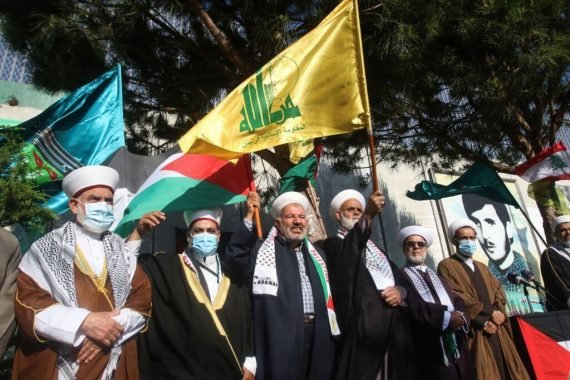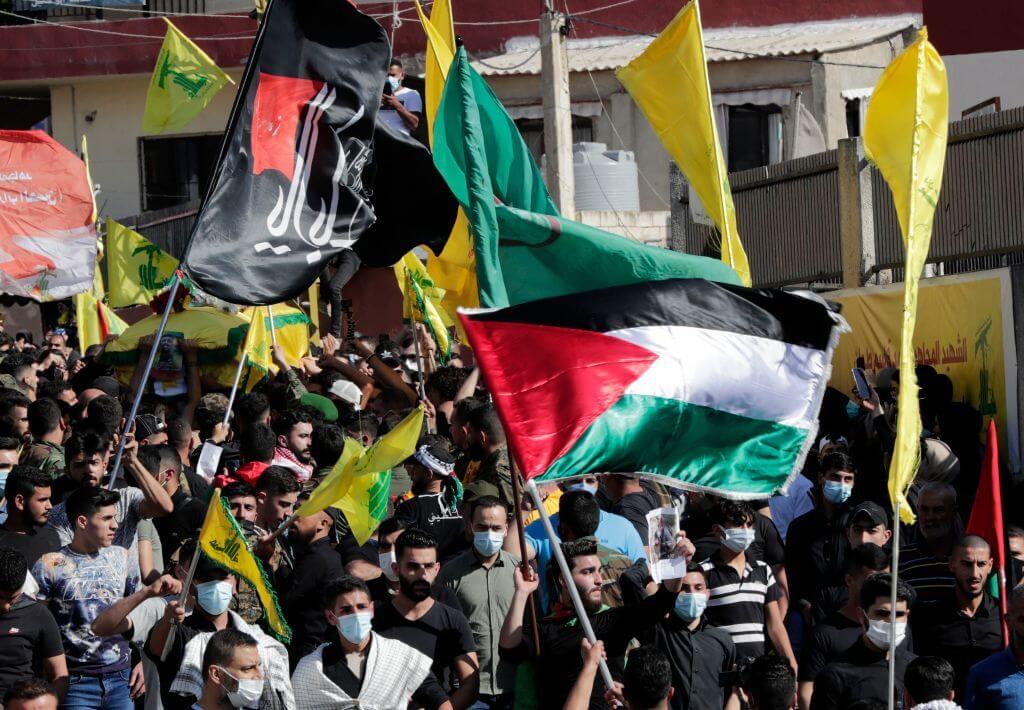For four decades, the Islamic regime in Iran has sought to gain legitimacy in the Arab world by portraying itself as a defender of the Palestinians. The latest events in May in the West Bank and Gaza, however, signal that a resurgent Palestinian resistance along the lines of nationalism, is threatening the ability of external actors — including Tehran — to co-opt the cause for its own benefit as it has in the past, including via proxy actors.
Paradoxically, while the regime in Tehran has historically sought to portray itself as working against Israel, it remains dependent on Israel’s actions to accomplish its objective of gaining moral legitimacy in the Arab world. At the same time, Israel depends on Iran to jump over the ever-lingering Palestinian question and mold ties with Arab neighbors who are paranoid of Iran’s expansionism.
A Prized Highjack
Since the Tehran regime’s founding in 1979, the question of Palestine has offered it an opportunity to extend its ideological influence into both the Islamic and Arab world. Following the overthrow of Mohammad Reza Pahlavi, the last shah of Iran, the newly installed regime headed by Ayatollah Khomeini found in the centrality of the Palestinian cause a way to win over hearts and minds of large swaths of people in the region. It also found a springboard to grow its influence beyond borders — and indirectly fulfill its stated goal of “exporting the revolution.”
Khomeini attempted to appeal to the Umma by deliberately bypassing the leaders of the Sunni-Muslim states, but results were underwhelming. Soon after the 1979 revolution, the Iranian regime began intervening in neighboring countries, and justified this as necessary to liberate Palestine. As early as the Iran-Iraq War in the 1980s, the regime in Tehran raised the ingenious slogan, “The path to Jerusalem passes through Karbala.” After the war, the Quds Force, ironically, became an overreaching military and intelligence arm in neighboring countries, as it realized that it could justify maintaining a presence in Arab countries so long as it claimed to defend the Palestinians.
While the regime in Tehran raised anti-Zionist slogans as a layer of its broader anti-American doctrine, it remained – paradoxically – dependent on Israel to accomplish its objectives. Israel remained a de-facto partner of the Islamic Republic in its anti-Saddam war throughout the ’80s, bombing Iraq’s Osirak nuclear reactor in 1981 and supplying Iran with arms throughout the war. Israel’s unjust and unlawful treatment of Palestinians, also, presented Iran with a golden ticket to keep intervening.
At the same time, the claim of fighting Israel allowed Iran to extend its reach. Tehran’s rhetoric and the sectarian nature of its newly founded regime also allowed it to establish a foothold among the Shia community in south Lebanon and to set up Hezbollah, its most prized asset overseas. The heavily armed Lebanese militant group became the most advanced point of the “Iranian influence archipelago” – sharing borders with the Islamic Republic’s ultimate foe, Israel.
By the time Hezbollah was up and running in the 1980s, Israel had beat the conventional armies of the Sunni-dominated Arab world into subjugation and two out of its four neighboring Arab states, Egypt and Jordan, were on the path to sign peace treaties with it. More so, the Palestinian Liberation Organization (PLO) became a shadow of itself following the Israeli invasion of Lebanon in 1982 resulting in the deportation of the Palestinian militants from the country. Hezbollah was left alone in the field especially with the PLO shifting course and engaging in “peace talks.” Tehran used these events to undermine the PLO and elevate its own proxy group, Hezbollah, as the real representative of the Palestinians.
Iran actively worked to vilify the PLO and went as far as labeling Palestine’s most iconic leader, Yasser Arafat, a “traitor.” In a fiery speech in Beirut’s suburbs in 1998, Hezbollah’s secretary general, Hassan Nasrallah, went as far as calling for the assassination of Arafat by invoking the example of Khaled Islambouli, an Islamist officer who assassinated Egyptian President Anwar Sadat in 1981. “Is there no Palestinian who can do what Khaled Islambouli did and say that Arafat’s presence on the face of this Earth is shameful to Palestinians and Muslims?” Nasrallah asked.
By overcoming Iran’s strategic isolation as a Shia revolutionary regime in a Sunni-dominated conservative region and extending its security perimeter to Lebanon and the Palestinian territories, Iran managed to brand itself as a pan-Islamic force fighting, first and foremost, for the Palestinian cause. The message was that Iran-backed Shias were fighting to liberate Palestine while Sunnis had abandoned it. Nasrallah made sure to echo this rhetoric and continuously peddle it in his speeches by raising the slogan, “We, the Shia of Ali ibn Abi Talib in the world, will never abandon Palestine, nor the people of Palestine, nor the sanctities of the Ummah in Palestine.” So, for Iran, it was the Shias that carried the torch of Palestine and Jerusalem, while Sunni states normalized.
Hamas Missiles on Jerusalem
During the latest round of violence, Iran relied on its historic formula of seeking to co-opt Palestinian resistance to increase its moral standing in the Arab world. It did this in two ways: by attempting to link itself to Hamas’s action, and by rallying Hezbollah to ramp up its rhetoric. Yet these attempts instead showcased the relative independence of Hamas as a Palestinian group, and the growing complexity of the Lebanese political scene, Hezbollah’s primary field of operation. It also highlighted the rise of a uniquely Palestinian nationalism that is leading resistance against Israel.
When Hamas started lobbing missiles on Jerusalem on May 10, 2021, following through on the May 5 warning of its armed wing to Israel over its attacks on Palestinian residents in occupied East Jerusalem, Hezbollah — with the support of Iran — found itself in a bind: on the one hand, they wanted to lay claim to what was happening, but on the other, they could not easily claim credit for Hamas’ actions. In the end, though, this seemed not to matter. The streets cared less about Hamas’s relations with Tehran and mobilized in full support of the Palestinians in general, who were also engaged in a unique moment of unity.
Part of the problem, for Iran, was Hamas’s relatively autonomous moves away from Tehran’s direct objectives, and its relative independence, underpinned by diversified sources of financial and military backing, in contrast to other sectarian-aligned ideological Iranian proxies. Meanwhile, Iran actively sought to tie both Hamas and Jerusalem (al-Quds) to its so-called axis of resistance.
Hamas’ relations had soured greatly with the axis as a result of its position on the Syrian uprising and its refusal to back the Syrian regime in its bloody crackdown on its own revolting civilians. By the time the war broke out in May this year, the process of fully reintegrating Hamas into the axis and improving ties with members of the axis had not been fully accomplished despite a visit by Hamas’s leadership to Bashar Al-Assad in Syria and the Palestinian group’s honoring of high-profile Houthi official Mohammed Ali Al-Houthi in Sanaa.
Hamas had to apologize for the photo-op between its representative in Sanaa and the Houthi leader due to the uproar it caused, specifically among Yemenis who are supportive of Hamas but opponents of the Iran-backed Houthis. The incident offered an idea of how challenging it will be for Hamas to retain wide support throughout the region if it continues to play on its dichotomies thinking it can outsmart all stakeholders.
Iran has also sought to co-opt the events in Palestine by tying the missile attacks on Israel to Qassem Soleimani, the Revolutionary Guard’s ex-Quds Force commander who was assassinated in January 2020 in an American drone strike in Baghdad. It had been Soleimani’s plan to build the missile capabilities of the Iran-funded and equipped sectarian militant groups in the region with the plan to overwhelm Israeli defenses when a conflict breaks out.
Recommended
Around the time of the conflict, Iran-backed Iraqi sectarian militias and the Houthis in Yemen had all ramped up their anti-Israel rhetoric, suggesting that they may be involved in a “next conflict.” But again, this rhetoric earned little traction in the Arab world, that instead remained transfixed by the mobilization of a new generation of young Palestinians, such as the Sheikh Jarrah activist twins Muna and Muhammad El-Kurd, who deployed social media to call for unified Palestinian resistance against Israel’s evictions and its bombardment of Gaza.
Mobilizing Hezbollah
Hezbollah’s response to the latest round of violence has showcased the complexity and difficulty of the situation the party finds itself in at the moment in Lebanon. Although Hezbollah is Iran’s most prized overseas asset – and the only militant group to ever give Israel a bloody nose in the 2006 July war – it was not able to make much of an impact with regard to recent events.
Following the outbreak of violence, the group resorted mostly to ramping its rhetoric to compensate for its inability to occupy center stage during the recent escalation, – something it has always sought to do, as a strategy of cooption and domination of the conflict with Israel. The party organized marches to the Lebanese-Israeli borders and called for mosques to raise prayers in support of Palestinians. Its anti-Israel statements have increased in frequency since the war in Syria was mostly concluded in favor of Bashar Al-Assad, the head of Syria’s regime, following the involvement of Iran, Russia, and Hezbollah to prop him up. Thus, Hassan Nasrallah’s speeches started emphasizing that they “are closer than ever to liberate Jerusalem.”

VIDEO: Iran’s proxies
Nasrallah’s invocation of the proximity of Jerusalem’s liberation in his speeches became a barometer of how far down the priority ladder such a claim is for the axis. However, it is routinely utilized to rally support and deflect attention on more pressing matters. Though it is true that Hezbollah remains deployed in Syria, Iraq, and Yemen, to name a few, Lebanon’s economic and institutional collapse coupled with a political deadlock are coming back to haunt the party whose very own supporters are starting to publicly express their frustration with the situation.
Hezbollah’s last-ditch effort to factor itself into what was happening in the recent round of violence was the three distinct rounds of missiles that were sporadically fired from Lebanon towards Israel that were either attributed to armed Palestinian factions in Lebanon or remained unclaimed. Hezbollah exercises dominant control over southern Lebanon and it is almost impossible for such rockets to be fired from the southern part of the country, which lies under Hezbollah’s complete control despite the presence of the Lebanese army and the UNIFIL forces, without either a nod from Hezbollah or in collaboration with it.
Ahead of anything else, these actions brought to light the new reality of the Lebanese political scene. The launching of missiles was either condemned by a considerable chunk of the Lebanese population reeling under the dire socioeconomic condition in the country, or even ridiculed as they paled in comparison to what Hamas was doing. The targeting of Iranian assets, Hezbollah, and the Syrian regime military posts in Syria by Israel with close to no pushback by the axis, has further degraded their deterrence abilities – at least in the eyes of the public.
By comparison, Egypt’s diplomatic involvement in the conflict and its ability to deliver a ceasefire without throwing Hamas under the bus, was a diplomatic win for the resurgent Arab nation, further warmed ties between Cairo and Hamas, and presented Iran and Hezbollah with a problem. While previously Iran’s propaganda depicted “(Sunni) Arabs” strictly as normalizers who had given up on Palestine, both Egypt’s role and the reaction of citizens across the Arab world, defied the narrative often spun by Iran and its proxies.
The Iranian regime has always needed Israel to bolster its legitimacy. So do its proxies, allies, and Hezbollah whose relationship with Tehran is more organic and puts it in a category of its own. The relation between Israel and the so-called resistance axis is symbiotic, and Tel Aviv’s policies are indispensable for Tehran to continue justifying its expansionism in the region.
While Iran still seeks to exploit the Palestinians for its benefit, there is increasingly dwindling interest in the Arab street for Iranian intervention. The slogans and the messaging of the protests that erupted in Lebanon and Iraq back in October 2019 are an explicit affirmation of that. Moreover, the growing visibility of Palestinian resistance – whether in Sheikh Jarrah or in Gaza – have shone the light on the indigenous movement for liberation and lent it support across the Arab world and elsewhere.
Growing Palestinian agency, especially among civilians in Palestinian territories, within Israel, or abroad could eventually further weaken Iran’s ability to co-opt the “cause,” especially if Palestinians succeed in translating their worldwide activism into a political road map. In that case, Palestinians will be able to build a wider support base for their just cause.
Meanwhile, Hezbollah struggles in Lebanon and the billboards it continues to erect around the country about the forthcoming day they pray in Jerusalem or of Qassem Soleimani being the “Martyr of Jerusalem” are not effective tools anymore. Crazy inflation rates and the lack of electricity, water, and fuel are factors pushing their supporters to question even the May 2000 liberation itself.






